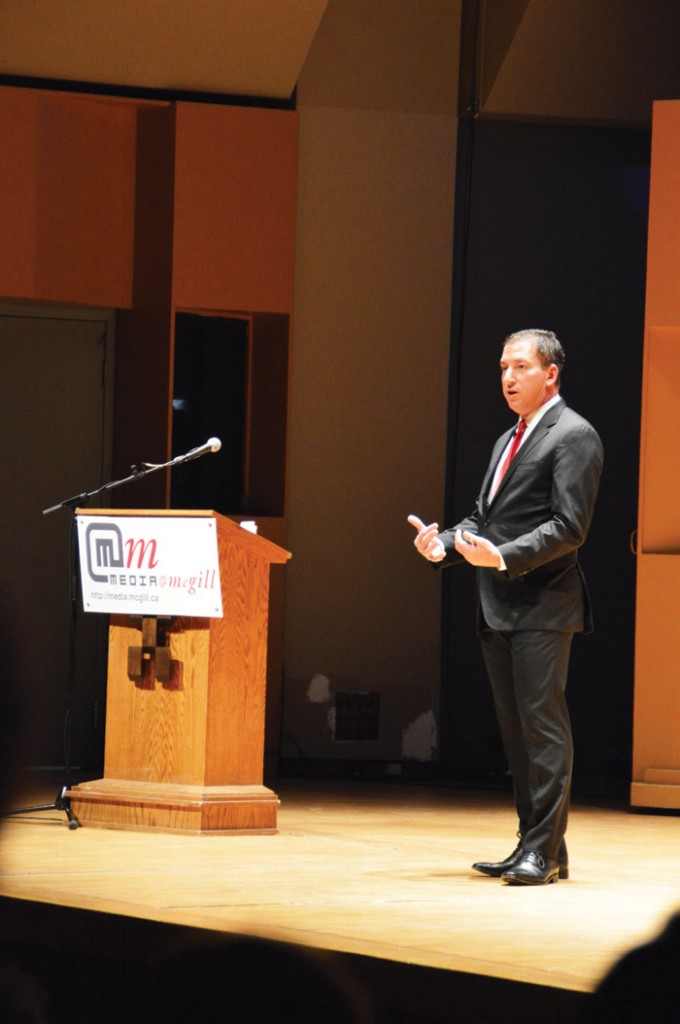Glenn Greenwald, award-winning journalist and this year’s Beaverbrook lecturer, spoke to McGill students and members of the Montreal community this Thursday, commenting on the recent terrorist attacks in Ottawa and Quebec and his work with National Security Administration (NSA) whistleblower Edward Snowden.
Greenwald began his lecture by addressing the attacks in Saint-Jean-sur-Richelieu and Ottawa—where two soldiers died in two separate assaults last week—and the discourse surrounding them.
“I kept reading all these accounts in Canadian press and hearing discussions on Canadian television along the lines of ‘It is shocking that there could be such brutal and savage violence in such a peaceful community in Canada,’” Greenwald said. “There is very much this sense [that] it’s difficult to understand why somebody would want to engage in active indiscriminate violence that way other than because there are extremist versions of Islam that cause people to be inherently violent.”
He deemed the acts of terrorism unsurprising, given Canada’s active involvement in wars overseas alongside the United States since 9/11.
“Regardless of whether you’re for it or against it, Canada has spent 13 years essentially involved in various wars—including the very long and not very constructive war in Afghanistan, the NATO intervention in Libya, which has left that country in hideous shape, and now this new bombing campaign in Iraq?” Greenwald said. “A country that is actively participating in military action in three countries in 12 years is not a country that can, in any sense of the word, be described as peaceful.”
Greenwald also questioned the democracy of nations that used systems of mass surveillance on their citizens and on the rest of the world. In 2013, Greenwald published documents that Edward Snowden revealed regarding the NSA in the United States, and Communications Security Establishment Canada (CSEC) surveillance efforts.
“The goal of the NSA and its partners in the Five Eyes Alliance—which includes CSEC—is nothing less than collecting all human electronic communications that take place on the planet,” he said. “[My] most stunning revelation is the subversion of democracy that comes from hiding these programs—equally stunning is the breadth and scope of the surveillance that is being done.”
Greenwald continued to elaborate on how secretive mass-surveillance programs undermine governments’ accountability.
“How are elections meaningful, as opposed to symbolic rituals, if we have no idea what the most consequential policies are that are being implemented by our governments?” Greenwald questioned. “I think it really underscored how much secrecy we’ve allowed in our governments in the name of fighting terrorism, to the point where it really has imperiled democracy in a very profound way.”
He also highlighted the negative effects surveillance has on citizens who now, as a result of his work, know they are being watched.
“When we as human beings believe that we are being watched […], our behaviour changes fundamentally,” he said. “Even those of us who think that we’re not being harmed by surveillance are […] harmed in all sorts of fundamental ways. A […] pervasive surveillance state creates a prison in the mind.”
Greenwald believes the publication of Edward Snowden’s documents changed the world and taught an important lesson about the power of individuals.
“It changed the way hundreds of millions of people around the world think not just about surveillance, but about privacy, government secrecy, journalism, and [the] role of the individual in relationship to the state,” he said. “Any institution built by humans—no matter how entrenched or formidable it might seem—can always be reformed, attacked, undermined, or destroyed and replaced by other human beings, as long as the conviction and the will on the part of even the most ordinary individuals is there.”
The Beaverbrook Lecture, which invited Greenwald to McGill, is the annual flagship event hosted by Media@McGill, a research and scholarship hub that focuses on issues and controversies within media.
“This year’s lecture is in line with last year’s, where Al Gore commented on the surveillance activities of the NSA, saying they were ‘outrageous’ and ‘completely unacceptable,’” Project Administrator for Media@McGill Sophie Toupin said. “Media@McGill believes it is important for the Canadian public to know what is at stake with surveillance in Canada and abroad.”
Jesse Stein, first-year journalism student at Concordia University, praised the lecture.
“I really respect what [Greenwald] has to say. I look at the type of work that he does, and it reflects a lot on the kind of work that needs to be done,” Stein said. “Personally, that hits a chord. I really feel like I got a lot out of it.”








